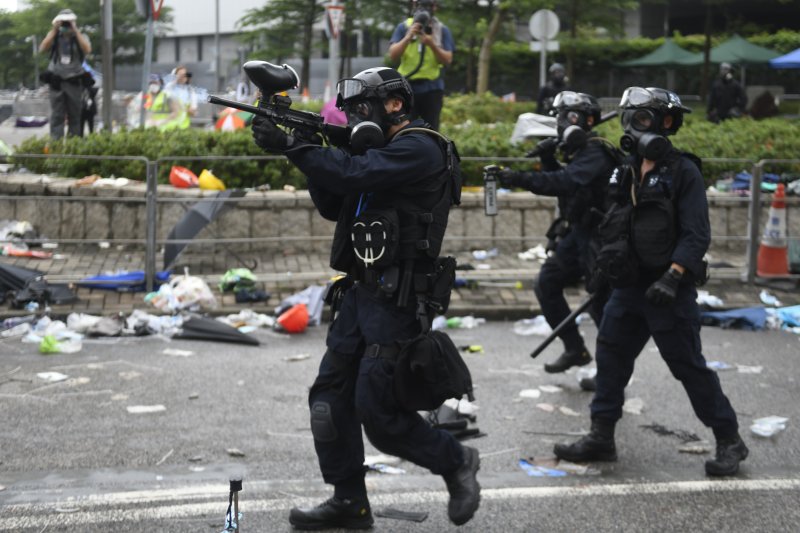Police use rubber bullets on protesters during a rally against an extradition bill outside the Legislative Council in Hong Kong, China, Wednesday. The bill, scheduled for a second reading on Wednesday has faced immense opposition from pan-democrats, the business sector, and the international community with concern over lack of human rights protections in mainland China. Photo by Vernon Yuen/ EPA-EFE
June 15 (UPI) -- A top official in Hong Kong Saturday halted a controversial China extradition bill ahead of more protests.
The bill would allow Hong Kong to extradite certain suspects to mainland China, sparking allegations that Bejing could use the law as a way to extradite people for political reasons with concern over lack of human rights protections there. Beijing and Hong Kong government deny these allegations.
Chief Executive Carrie Lam said during a press conference Saturday that the government had not done a good enough job communicating the need for the bill.
"I feel deep sorrow and regret that deficiencies in our work - - and various other factors - - have stirred up substantial controversies," Lam said.
The government canceled a second reading of the bill otherwise due to take place this month, Lam said.
Lam also indicated it is unlikely the bill will pass this year with no timeline for discussions to resume.
"We have made many attempts to narrow differences and eliminate doubts," Lam said. "In the last week, tens of thousands of people took part in protests and gatherings. Serious conflicts broke out . . . resulting in a number of police officers, media workers and other members of the public being injured. I am saddened by this."
Two protests took place against the legislation last week, one a peaceful march by more than one million people Sunday, and another Wednesday that broke out in violence with 80 people injured.
The Civil Human Rights Front, and the pro-democracy Confederation of Trade Unions, who organized Sunday's march, plan to carry out another march this coming Sunday.
Lam said that her decision to suspend the extradition bill was not based on concern about Sunday's protest, but was about restoring calm in society.
"On Wednesday, polarized views gave rise to violence, and very serious confrontation," she said. "I needed to do something decisively to address the issue. How can I restore calmness in society and avoid more law enforcement officers being injured? I need to ask my advisers, I needed to think it through. Our team has to deliberate."
Hong Kong, a city of over seven million people, is part of China, but has free speech and other rights normally seen in the West instead of a communist country. It operates under a concept known as "one country, two systems," which means that it runs its own finances education, immigration policy and judiciary. The unique concept came about because it was a British colony until 1997 when the United Kingdom worked out a deal to turn Hong Kong back over to China under the stipulation that Hong Kong residents would continue to enjoy many of the rights that they had as British subjects. The agreement with Britain only lasts for 50 years and ends in 2047, so there is concern that residents could lose a lot of their Democratic rights once it formally joins with the rest of China.















